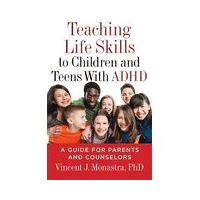“Teaching Life Skills to Children and Teens With ADHD: A Guide For Parents and Counselors”

“Teaching Life Skills to Children and Teens With ADHD: A Guide For Parents and Counselors”
By Vincent J. Monastra, Ph.D.
American Psychological Association
Washington, D.C., 2016
Workbook about ADHD stresses importance of life skill development
Reviewed by Kerry Morrison, Psy.D.
Vincent J. Monastra, a clinical psychologist and director of an Attention Disorders Clinic in Endicott, N.Y., is a well-known clinician, author and researcher in the field of ADHD.
He has written many helpful books of the subject and his latest publication is no exception.
With the increase of children and adolescents being diagnosed with ADHD, this publication is very helpful as it focuses on issues beyond the consultation room, classroom or home.
The author’s premise is that treatment of ADHD needs to go beyond the symptoms to what skills we want our kids to learn. This book addresses the importance of life skill development and provides a workbook-like format to help kids attain these skills.
Monastra states that about five percent of kids have a degree of inattention, impulsivity or restlessness at home, school or both.
The author describes the hallmark symptoms of ADHD. He opines that hyperactivity is a lack of understanding about boundaries and personal space and inattention is a lack of focus on details and/or inability to remember things unless it is something of interest.
Assessing where these symptoms occur is important as it is rare to have them occurring in just one situation. He convincingly argues that evaluation of other medical and psychological issues before making the diagnosis of ADHD is essential.
At his clinic, he has found that 33 percent of children have a vitamin D deficiency or insufficiency that can cause symptoms of inattention and mood problems. In addition, he has found that 25 percent of his clients have undiagnosed visual problems.
Once these issues have been ruled out, then one can begin to consider an ADHD diagnosis.
Included in this volume are ADHD Checklist and a Functional Assessment Checklist, which are both very useful for parents and counselors.
The book is organized along the simple lines of basic life functions: eating, sleeping, exercising, communicating, confidence building, making friends, interpersonal conflicts, anger management, showing appreciation/gratitude, kindness, organization and persistence.
Each skill chapter has helpful tips, useful worksheets and charts that can easily be copied for kids and parents to use to practice these skills.
The author offers good advice and life lessons for all children and parents, not just those with ADHD.
The book concludes with a section on organization that provides many worthwhile and practical lists for kids to use at both home and school. In closing, I would highly recommend this practical and extremely useful guide for educators, counselors and parents.
Kerry Morrison, Psy.D. is a licensed psychologist in private practice in Greenfield, Mass., who also consults, teaches and provides trainings on mental health topics.
Learn more about the book: Teaching Life Skills to Children and Teens With ADHD: A Guide for Parents and Couselors (Lifetools: Books for the General Public)
